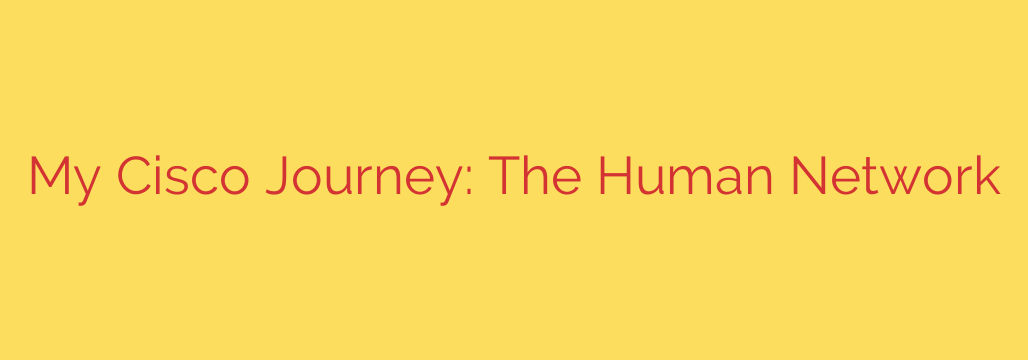
Succeeding in a Networking Career: Why Your Connections Matter as Much as Your Certifications
For anyone starting their journey in network engineering, the path often looks the same: long nights spent in front of a command-line interface, endless hours practicing in Packet Tracer, and the daunting challenge of a certification exam like the CCNA looming on the horizon. Technical expertise is the foundation of any successful IT career, but it’s a common misconception to believe it’s the only thing that matters.
While mastering subnetting, routing protocols, and switch configurations is essential, there is another, equally powerful network you must build: the human network. Technical proficiency is the price of admission, but your professional connections are what truly accelerate your career growth.
The Turning Point: Moving Beyond the Textbook
Many aspiring network engineers focus so intensely on the hardware and software that they overlook the people who design, manage, and secure these systems. The real breakthrough in your career often comes when you realize that the most complex and valuable network isn’t made of copper wires and fiber optics, but of mentors, peers, and colleagues.
This “human network” acts as a support system and a knowledge base that no textbook can replicate. It’s the senior engineer who can explain a complex concept in five minutes that you’ve struggled with for five hours. It’s the study group that keeps you motivated when you feel like giving up. Your professional network is a powerful multiplier for your technical skills, turning theoretical knowledge into practical wisdom.
The Power of Community in a Complex Field
Networking is a vast and constantly evolving field. No single person can know everything. This is where the power of community becomes your greatest asset.
- Shared Knowledge: When you encounter a bizarre routing issue or a security vulnerability you’ve never seen before, someone in your network has likely faced it. Online forums, Discord channels, and professional groups on LinkedIn become invaluable resources for real-world problem-solving.
- Mentorship: A good mentor provides more than just technical answers; they offer a roadmap. They can help you navigate corporate politics, advise you on which specializations to pursue (like cybersecurity or cloud networking), and prepare you for job interviews. A mentor’s guidance can help you avoid common career pitfalls and make smarter decisions.
- Motivation and Accountability: Studying for certifications like the CCNA or CCNP can be a long and lonely road. Being part of a study group or having peers on the same journey provides the accountability and encouragement needed to cross the finish line. Celebrating each other’s successes and troubleshooting failures together builds resilience.
Bridging the Gap from Certification to Career
One of the most common questions from newly certified professionals is, “I passed my exam, now what?” They apply to dozens of jobs online and often hear nothing back. This is where the human network demonstrates its most tangible value.
Many of the best job opportunities are never posted on public job boards. They are filled through referrals from trusted employees. When a hiring manager gets a resume from a current team member who can vouch for the applicant’s skills and character, that resume goes straight to the top of the pile. A strong professional network can open doors that a resume alone cannot. It provides the credibility and context that employers are desperately looking for.
Actionable Steps to Build Your Professional Network
Building your human network doesn’t have to be intimidating. It’s about genuine connection and a willingness to learn and contribute. Here are a few practical steps you can take today:
- Engage with Online Communities: Become an active participant in places like the Cisco Learning Network, relevant subreddits (like r/networking and r/ccna), and industry forums. Don’t just ask questions; try to answer them, even if you’re just starting out.
- Leverage LinkedIn Intelligently: Don’t just collect connections. Follow industry leaders, comment thoughtfully on their posts, and share articles or insights you find interesting. When you connect with someone, send a personalized note explaining why you want to connect.
- Find a Mentor: Look for senior engineers in your company or on professional platforms. Many experienced professionals are happy to share their knowledge with those who show initiative and a genuine desire to learn. Be respectful of their time and come prepared with specific questions.
- Share What You Learn: Start a simple blog, post on LinkedIn, or create short videos explaining concepts you’ve recently mastered. Teaching is one of the best ways to solidify your own knowledge, and it positions you as a motivated, engaged member of the community.
- Attend Meetups and Conferences: Whether virtual or in-person, industry events are fantastic places to meet peers and learn about emerging technologies. Step out of your comfort zone and introduce yourself to others.
Ultimately, a career in networking is about building robust, reliable, and secure connections. This principle applies just as much to people as it does to routers and switches. By investing in your human network, you are not just preparing to pass an exam—you are building the foundation for a long and successful career.
Source: https://feedpress.me/link/23532/17168919/the-human-network-my-journey-with-cisco








